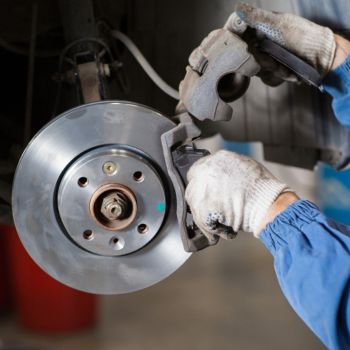 Brakes are designed to stop a vehicle that typically weighs around 4,000 pounds. However, the friction involved in this process can generate a lot of heat, which may lead to overheating and damage to other parts of your car. Understanding how this happens and what you can do to prevent it is essential for safe driving.
Brakes are designed to stop a vehicle that typically weighs around 4,000 pounds. However, the friction involved in this process can generate a lot of heat, which may lead to overheating and damage to other parts of your car. Understanding how this happens and what you can do to prevent it is essential for safe driving.
How Your Brakes Work
Most modern cars use disc brakes. These consist of a solid or ventilated disc located near each wheel, held in place by brake pads. When you press the brake pedal, hydraulic pressure from the brake fluid forces the pads against the disc, creating friction that slows down the car. This system is efficient, but it’s not without its challenges—especially when it comes to heat management.
The friction between the pads and the disc generates significant heat. While some of this heat is absorbed by the components themselves, the brake fluid also plays a role in dissipating it. In some cases, the design of the disc (like slotted or cross-drilled) helps with cooling. Still, if the system isn’t maintained properly, heat buildup can become a serious issue.
Common Causes of Brake Overheating
Overheating can occur due to several factors, including:
- Worn or damaged brake pads. As they wear down, they may rub against other parts, increasing heat and reducing effectiveness.
- Misaligned components. If the pads don’t sit correctly, uneven pressure can cause excessive wear and heat buildup.
- Improper bed-in of new pads. New brake pads need time to settle and work properly with the rotors. Skipping this step can lead to premature overheating.
- Failure to allow brakes to cool. Continuous use, especially in heavy traffic or on steep hills, can keep the system hot, leading to brake fluid boiling and reduced performance.
- Moisture in the brake fluid. Brake fluid is hygroscopic, meaning it absorbs water over time, lowering its boiling point and increasing the risk of overheating.
- Glazed or melted brake pads. Excessive heat can cause the material on the pads to melt, reducing friction and making the brakes less effective.
Signs That Your Brakes Are Overheating
If you notice any of these signs, it could mean your brakes are overheating:
- The brake warning light is illuminated on your dashboard.
- You hear a high-pitched squeak or creaking noise when braking—this often indicates glazed pads or worn linings.
- Your brake pedal feels soft or spongy, which can be a sign of moisture in the brake fluid or air bubbles forming.
- You smell a burning odor when applying the brakes, which may indicate sticking components or excessive dust buildup.
What You Should Do If Your Brakes Overheat
If you suspect your brakes are overheating, it’s important to act quickly. Here’s what you should do:
- Stop driving as soon as it’s safe to do so. Continuing to drive can increase the risk of brake failure or even a fire.
- Pull over to a safe location, away from traffic.
- Try to roll the car to a gradual stop if possible.
- Once stopped, engage the parking brake to help the brake discs cool down by separating them from the rotor.
- Do not attempt to drive again until the brakes have fully cooled. Schedule a service appointment immediately for a professional inspection.
- If the car doesn’t feel safe to drive, consider having it towed to a repair shop.
How to Prevent Future Brake Overheating
To reduce the risk of overheating, follow these tips:
- Apply the brakes gradually and gently instead of slamming them.
- Avoid “riding†the brakes, especially when descending hills. Use engine braking to slow down instead.
- Keep up with regular maintenance, including checking and replacing brake fluid as needed.
- Have your brakes inspected regularly, especially if you drive in hilly areas or frequently in stop-and-go traffic.
If you're concerned about the condition of your car's braking system, don't wait. Contact DaSilva’s Auto Body today for a thorough inspection and necessary repairs. Keeping your brakes in good shape is key to safe and reliable driving. Don’t ignore the signs—your safety depends on it!
Capsule Filling Machine,Powder Capsule Filling Machine,Ready Stock Automatic Capsule Filler,Fully Automatic Capsule Filling Machine
Jiangyin Longchang Machinery Manufacturing Co,Ltd , https://www1.jylongchanggrinderline.com